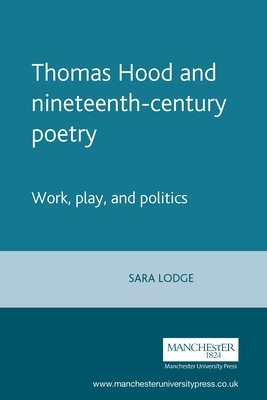
- We will send in 10–14 business days.
- Author: Sara Lodge
- Publisher: Manchester University Press
- ISBN-10: 0719087872
- ISBN-13: 9780719087875
- Format: 15.6 x 23.4 x 1.3 cm, softcover
- Language: English
- SAVE -10% with code: EXTRA
Reviews
Description
This is the first modern critical study of Thomas Hood, the popular and influential nineteenth-century poet, editor, cartoonist and voice of social protest. Acclaimed by Dickens, the Brownings and the Rossettis, Hood's quirky, diverse output bridges the years between 1820 and 1845 and offers fascinating insights for Romanticists and Victorianists alike. Lodge's timely book explores the relationship between Hood's playfulness, his liberal politics, and contemporary cultural debate about labour and recreation, literary materiality and urban consumption.Each chapter examines something distinctive of interdisciplinary interest, including the early nineteenth-century print culture into which Hood was born; the traditional, urban and political ramifications of the grotesque art and literature aesthetic; the cultural politics of Hood's trademark puns; theatre, leisure and the 'labour question'. Lively and accessible, this book will appeal to scholars of nineteenth-century English
Literature, Visual Arts and Cultural Studies.
EXTRA 10 % discount with code: EXTRA
The promotion ends in 11d.17:24:15
The discount code is valid when purchasing from 10 €. Discounts do not stack.
- Author: Sara Lodge
- Publisher: Manchester University Press
- ISBN-10: 0719087872
- ISBN-13: 9780719087875
- Format: 15.6 x 23.4 x 1.3 cm, softcover
- Language: English English
This is the first modern critical study of Thomas Hood, the popular and influential nineteenth-century poet, editor, cartoonist and voice of social protest. Acclaimed by Dickens, the Brownings and the Rossettis, Hood's quirky, diverse output bridges the years between 1820 and 1845 and offers fascinating insights for Romanticists and Victorianists alike. Lodge's timely book explores the relationship between Hood's playfulness, his liberal politics, and contemporary cultural debate about labour and recreation, literary materiality and urban consumption.Each chapter examines something distinctive of interdisciplinary interest, including the early nineteenth-century print culture into which Hood was born; the traditional, urban and political ramifications of the grotesque art and literature aesthetic; the cultural politics of Hood's trademark puns; theatre, leisure and the 'labour question'. Lively and accessible, this book will appeal to scholars of nineteenth-century English
Literature, Visual Arts and Cultural Studies.


Reviews